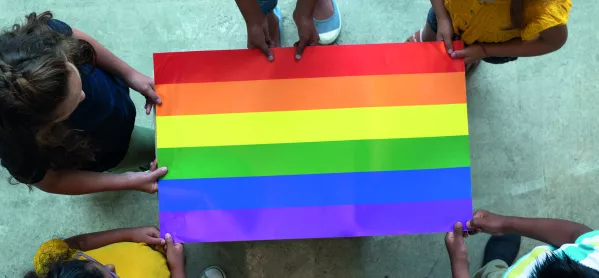- Home
- ‘Shield children from real threats - not LGBT rights’
‘Shield children from real threats - not LGBT rights’

Back in 2000, the fledgling Scottish Parliament achieved one of its great early successes with the repeal of Section 28, the discriminatory legislation that barred local authorities from “promoting” homosexuality in schools.
In the intervening years, huge progress has been made regarding LGBT+ rights, both in schools and in wider society: equal marriage legislation was passed in 2014 and, of course, the remarkable TIE campaign has now secured a commitment to LGBT+-inclusive education in all of Scotland’s schools.
But it wasn’t all plain sailing, and there were plenty who wanted Section 28 kept firmly on the statute books.
Quick read: Scotland claims ‘world’s first’ inclusive LGBTI education
Politics and education: Education must be ‘taken out of the political circus’
Long read: ‘Whatever a trans pupil says they need to feel safe, just do it’
The Keep the Clause campaign used schoolkids as a cover for a fight against progress, and the well-worn appeal to “legitimate concerns” was to mask what was always, obviously, just run-of-the-mill homophobia.
LGBT rights in schools
Those tactics were manifested in a number of ways, from malign scare stories to now-infamous newspaper front pages, and took us all the way to a pretend referendum bankrolled by billionaire (and one-time SNP donor) Brian Souter. And all the while, the campaigners insisted that we had to “protect our children”, but in truth their goal was the maintenance of an educational status quo hostile to LGBT+ people across the country.
The campaigners lost, but they did plenty of damage along the way, and it must have been a particularly tough time for LGBT+ kids in Scotland’s schools. Which, sadly, brings us to 2019, where the increasingly toxic rhetoric around trans rights now risks engulfing schools once more.
Last month, it was reported that a 17-year-old from Aberdeenshire claimed to have been suspended for three weeks purely for insisting that there are “only two genders”. The story was accompanied by a video that the pupil had covertly recorded.
Those sharing the story on their social media feeds included the SNP leader on Inverclyde Council, Chris McEleny, who tweeted: “This is crazy. It’s clear teachers are worried that they need to watch their backs and that children of independent thought are being told to accept a worldview that’s being imposed on them.”
And former Ukip leader Gerard Batten got in on the action, describing the boy as “tremendously brave” and a “young hero”.
But there’s a very obvious problem: neither the article nor the video offer anything like enough evidence to draw conclusions about this situation, and any reasonable, responsible adult should know better than to dive in head-first. Of course, none of that mattered to people so eager to use schools and their pupils for their own ends.
The fear is that this is just the beginning and that, having successfully convinced some that trans people in bathrooms are a threat to women, the next step is painting trans people, and trans rights, as a threat to children. Simultaneously, we can expect to see criticism dismissed as an attack on free speech or the imposition of a terrible new orthodoxy on impressionable minds. The specifics may have changed in the past 20 years, but the fundamental tactics have echoes of those employed at the turn of the century.
When these sorts of regressive campaigns turn their attention to schools what inevitably becomes clear is that the kids don’t really matter - they just become a vehicle for the pursuit of an ideological victory against whichever marginalised minority group has the temerity to seek equality, to speak up or even to exist. It’s never, ever, ever about protecting children, but rather about weaponising them - and that is simply unacceptable.
The increasing profile of transgender issues and rights is, like LGBT+-inclusive education more broadly, a good thing. Of course, it will have consequences in schools, but it is vital that regressive, political agendas don’t become one of them.
Protect our children? Absolutely. But let’s be sure to shield them from the real threat instead of an imaginary one.
James McEnaney is a journalist, FE lecturer and former schoolteacher in Scotland
Keep reading for just £1 per month
You've reached your limit of free articles this month. Subscribe for £1 per month for three months and get:
- Unlimited access to all Tes magazine content
- Exclusive subscriber-only stories
- Award-winning email newsletters



